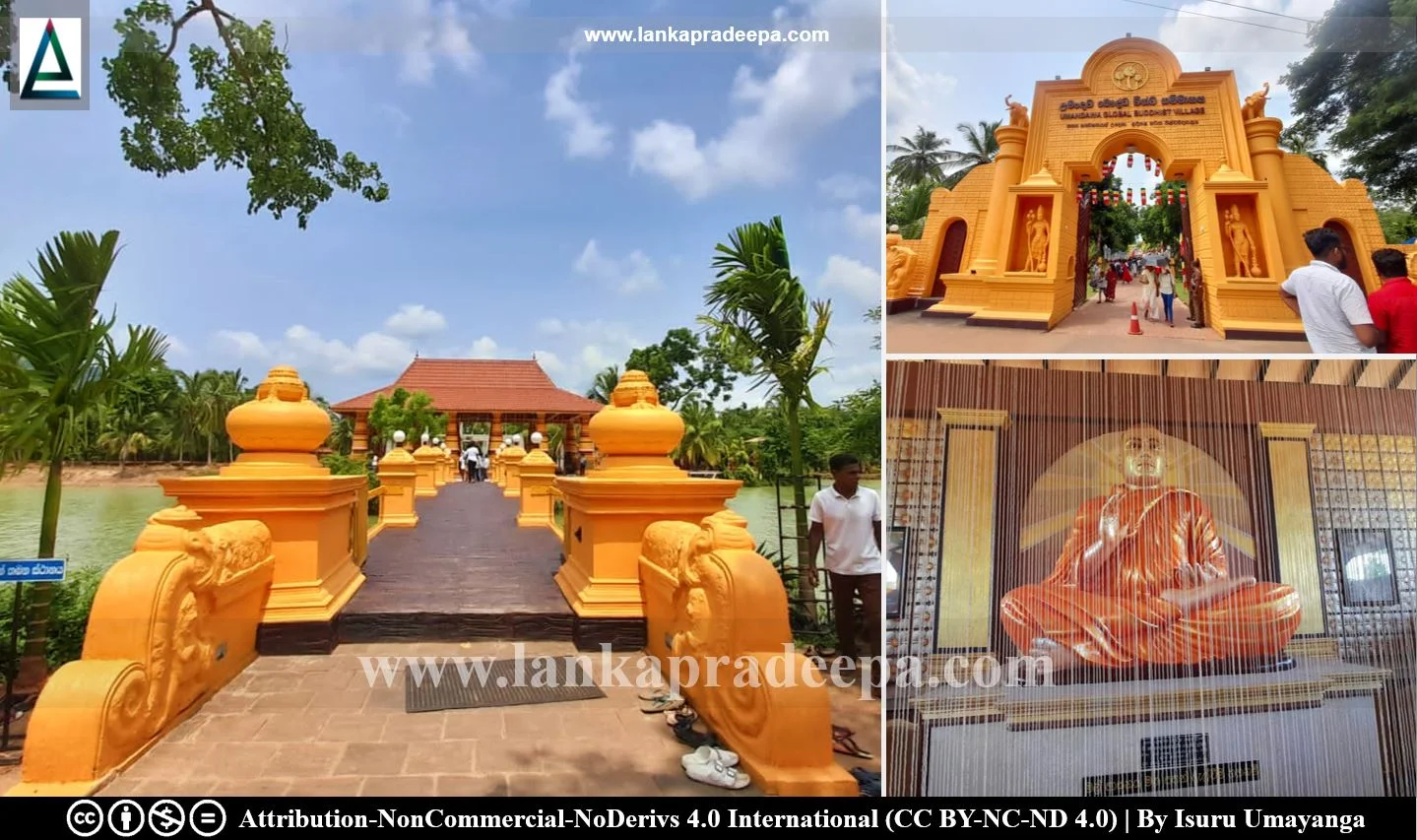
|
Umandawa Global Buddhist Village |
Umandawa Global Buddhist Village, also known as Umandawa Maha Vihara Monastery (Sinhala: උමංදාව මහා විහාර අසපුව, උමංදාව බෞද්ධ විශ්ව ගම්මානය), is a recently-built religious site situated in Madahapola village near Malsiripura town in Kurunegala District, Sri Lanka. The monastery is controlled by a controversial monk in yellow robes, Siri Samantha Badra (formerly Pitiduwe Siridhamma), who asserts himself as an Arhat, a designation reserved for one who has destroyed or abandoned four things: birth (Jati), the Asavas, the fetters (Samyojana), and the burden [(Bhara) De Silva, 2023]. Declaring oneself as an Arahat is controversial in Sri Lanka, as well as in other Theravada Buddhist countries and therefore, many people are sceptical of Siri Samantha Badra's claims of being an Arahat (De Silva, 2023). Consequently, he has lost the respect of his fellow monastics, with both monastics and laity routinely critiquing his ideas (De Silva, 2023). Further exacerbating the situation, additional charges have been levelled against him due to his attempts to emulate a Buddha (De Silva, 2023).
Presently, Siri Samantha Badra stands as a figurehead for a small minority of Buddhists but they include some celebrities, upper-middle-class wealthy individuals, and ordinary locals (De Silva, 2023). Politicians with ambitions attend his sermons and other programs with the anticipation of garnering his support and assistance (De Silva, 2023).
A Non-profit Organisation
The Umandawa Maha Vihara Monastery operates as both a Buddhist monastery and a non-profit organisation. It is officially registered under the name "Umandawa Maha Vihara Monastery" as a brand and "Siri Sadaham Ashramaya" as the company name. The organisation's headquarters is in Dehiwala, Colombo (Thilakarathne, 2021).
Siri Sadaham Ashramaya
Siri Sadaham Ashramaya was founded in 2004 by the monk Siri Samantha Badra with the primary objective of disseminating Dhamma for both practical and spiritual benefits, contributing to the overall development of individuals (Thilakarathne, 2021). Since its inception, it has served as a focal point for numerous followers, including monks, nuns, volunteers, and donors who are drawn to the teachings of Siri Samantha Badra. Presently, Siri Sadaham Ashramaya is led by Siri Samantha Badra and an executive committee (Thilakarathne, 2021). Every member of this committee is a paid member and it is the body where most of the fundraising, administration and marketing activities of this company are carried out (Thilakarathne, 2021).
Establishment of Umandawa Maha Vihara Monastery
As an idea of Siri Samantha Badra and his followers, Umandawa Maha Vihara Monastery was established in 2015 as an extension of Siri Sadaham Ashramaya, serving as its second monastery (De Silva, 2023; Thilakarathne, 2021). The term Umandawa means "the land of wise", originally derived from the Sanskrit word Ummaga (De Silva, 2023).
Presently, the community of Umandawa Maha Vihara Monastery resides on self-owned and self-administered land spanning approximately 70 acres (Thilakarathne, 2021). The land was purchased in December 2015 with the financial support of a Buddhist monk (now deceased) and many other donors (Thilakarathne, 2021). The monastery community encompasses around 100 individuals, comprising monks, nuns, resident volunteers, donors, and retired members (Thilakarathne, 2021).
Bhikkhunis (Buddhist nuns) at Umandawa
The Bhikkhuni order in Sri Lanka was founded in the 3rd century B.C. but its prominence waned during the 11th century A.D. (De Silva, 2023). In the late 20th century, individuals participating in the international movement took initiatives to revive the Bhikkhuni order in the country and as of today, there are over 4,000 nuns across the country. Despite their significant numbers, this re-established Bhikkhuni order does not receive official recognition from the government or the monastic authorities in Sri Lanka (De Silva, 2023).
In 2016, the Umandawa nuns participated in a Samaneri (novice nuns) ordination ceremony. This event was facilitated with the guidance and participation of one of the first Sri Lankan Bhikkhunis, the late Ven. Bhikkhuni Kolonnawe Kusuma, who received ordination in 1996 in Sarnath, India (De Silva, 2023). The Bhikkhunis in Umandawa live in a small, close-knit community and are directly supervised by Samanthabadra and his disciple monks (De Silva, 2023).

|
Umandawa Global Buddhist Village |
Related Posts
Read Also
References
Journal Articles
1) De Silva, G., 2023. Umandawa: Buddhist Transformation in Modern Sri Lanka. Religions, 14(1), pp.1-18.
2) Thilakarathne, C.D., 2021. The role of adaptive capacity in supporting resilient livelihoods: an asset-based approach at Umandawa Maha Vihara Monastery, Sri Lanka (Master's thesis, Norwegian University of Life Sciences). pp.8,38-39.


